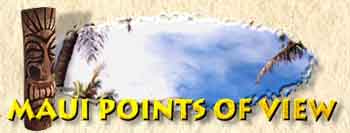TALK STORY
by Mike Maui
This begins a series of stories written by my very good friend Mike Cappadona. The
first tale Mike tells relates his inheritance of a cherished island tradition, and sets a framework for the rest. Ed.
WHAT'S IN A NAME?
The Zen of Basket Weaving
Mike Cappadona
I met him sometime during my first year living on the island of Maui. I was twenty-two years old, rambunctious and giddy, and had
spent most of that year cruising the single road which circled the island, camping and indulging in the delicious Hawaiian nature. I had made
friends on different sides of the island, and would hole up in one of these towns for a bit, earn some cash, and then spin around the island some more.
It was the lush southeastern coast near Hana which I preferred, and it was here that I came to know a man who was to enrich my life immeasurably.
This part of the island has a rhythm all its own, much slower and more laid back than the developed areas. Cars bump single file around hairpin
turns, on many occasions dangling precariously close to precipitous edges and on others tumbling into luxuriously tropical valleys. In one
such lovely valley I made my first acquaintance with the hat maker I know as Umi.
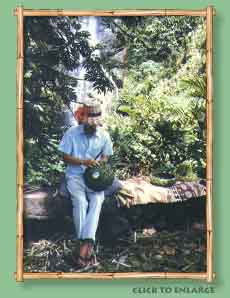 Umi was a local man, born and raised in the islands, but familiar with the world. He occupied a very beautiful cove at the base of a wondrous waterfall, where he made
himself quite visible by weaving hats and baskets of coconut palm leaf. His proximity and visibility, along with his charming and elegant mannerisms, made
him popular with passing tourists, and ultimately, quite successful selling his wares.
Umi was a local man, born and raised in the islands, but familiar with the world. He occupied a very beautiful cove at the base of a wondrous waterfall, where he made
himself quite visible by weaving hats and baskets of coconut palm leaf. His proximity and visibility, along with his charming and elegant mannerisms, made
him popular with passing tourists, and ultimately, quite successful selling his wares.
Each time I would pass his waterfall, I would stop and spend time chatting with him and observe him in action. He would casually and contentedly
produce lovely baskets and unique hats, selling them practically as fast as he could make them. Tourists would snap his picture continually, and
he would nod graciously in acknowledgement. A friendship developed, and when I finally settled down on that side of the island, I would do odd
jobs for him at his house and visit with him often, learning more about the man, and developing love and respect for him.
So it was, that I was very saddened one particular day, when he revealed to me that he had cancer of the stomach, and his illness had been
declared terminal. He asked me if I would accept an offer to be his apprentice; he would show me all he could about his craft, while I would help
him with the everyday chores which were gradually becoming more difficult for him.
I soon found myself living in a small hut in the rain forest with Umi and his
two dogs. We had no electricity, took our baths in a nearby stream, and had a pit-style outhouse for a toilet. I would cook for us and drive him to
his doctor appointments, and each day receive instruction on some part of the art of coconut-leaf hat and basket making.
Umi told me that he learned from an old man on the beach in Waikiki in the 1940's when he was a kid, partly because he was able to climb the palm
trees - this being a vital prerequisite to being able to weave at all! We would wander through gorgeous coastal pastures searching out the perfect palms
to practice my climbing techniques. He would instruct me on the necessary proportions required for weaving a hat or basket that would live up to his standards of quality, showing
me how the perfect branch would bend in the wind. He enlightened me to aspects of his art which would enhance my life - how the concentration required
for a safe climb could become meditation; how the physical aspect of the climb would improve my strength, balance and coordination; how the food
of this tree would enrich me and bring me closer to a partnership with this plant that would ultimately procure for me the money required
to exist socially.
He likened the actual weaving at the waterfall to a "parlour trick." but insisted that each item should be "worthy as a gift for my mother." He reinforced
the importance of gratitude at being able to manifest a livelihood in harmony with our surroundings, and in a way conducive to our chosen lifestyle, and with the freedom to travel anywhere
in the world occupied by coconut trees and tourists, and I have found that to be true. For me, from now on, the coconut palm would be the
Tree of Life, as it is widely known and regarded as such by all the Polynesian peoples.
So, as with the progression of the learning process, and the nature of cancer, I slowly became a better weaver, and Umi's physical self began
to diminish considerably. He became less ale to make attendance at the waterfall, and I ventured out alone to sell the products we would weave together
in the evening.; People noticed his absence, and soon, friends of his from all over the island began to visit him in our jungle hideaway sensing
that his inevitable departure was soon at hand. I noticed that people regarded him by different names, some called him Umi, others Oonie, or Bobby, or
Mr. Kang. When I asked him about it he replied, "'What's in a name?' They all know me as who I am."
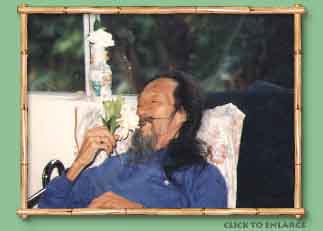 Toward the end, he had not even the strength to weave, but would instead verbally correct me as I crafted hats and baskets perched
on a stool in front of his bed.
Toward the end, he had not even the strength to weave, but would instead verbally correct me as I crafted hats and baskets perched
on a stool in front of his bed.
We would spend countless hours talking about the adventures of his life, as he had circled the world by sailboat, and had
stories of love and tragedy befitting a best seller. His eyes would glaze and his face would smile, as he relived and recounted the events which
occupied his memory, and had been the sustenance of his being. I was introduced to and became friends with close consorts of his, and was
observer to many emotional reunions and listened to incredible reminiscence of times and places where their lives had intermingled wildly. I
came to realize that this man was loved by many, and had lived a life of daring adventure and wondrous curiosity, never succumbing
to conformity, being fully, a life-artist.
So, when he took his final breath, he accepted this process as that of "passing on to another plane." He asked that his ashes be put into any
river, as "all the rivers lead to the sea." and he wished only that we all have an adventurous journey.
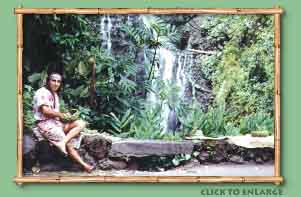 As years passed, I continued to weave at the waterfall, occupying a place slightly to the right of the seat used by my friend, leaving
the spot open for his spirit, sensing his presence, and inviting his company. Hawaiians in the community honored me with acknowledgement of
my weaving ability, and suggested I was an acceptable protegee for the man whom they'd admired.
As years passed, I continued to weave at the waterfall, occupying a place slightly to the right of the seat used by my friend, leaving
the spot open for his spirit, sensing his presence, and inviting his company. Hawaiians in the community honored me with acknowledgement of
my weaving ability, and suggested I was an acceptable protegee for the man whom they'd admired. I would have far-off adventures of my own, using his
gift wherever possible, and reciting the story of Umi to all who would inquire how a boy from New York had learned to do something like this.
And as I travelled the world people began to know me by different names; some called me Michael, or Miguel, others know me only Mykee, or Mike Maui, and always I am
reminded of my friend - how he learned me more than just to weave a basket or a hat. How he showed me to respect and to appreciate the time
we have in this life, and that the fruit is there for those that dare to climb, and that Quality should be an essence of all that we do.
He told me that one day I would meet the right person to pass on these lessons which disguise themselves as hats
and baskets of palm; that I would know this person as he had known me, and that after I had taken my final breath, I will meet with him again,
having taken a different river to the same sea, and that I won't need to call him by any name, as I'll know him by who he is.
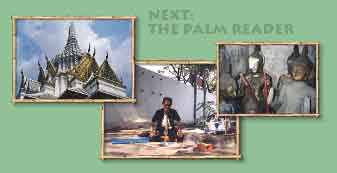
|
